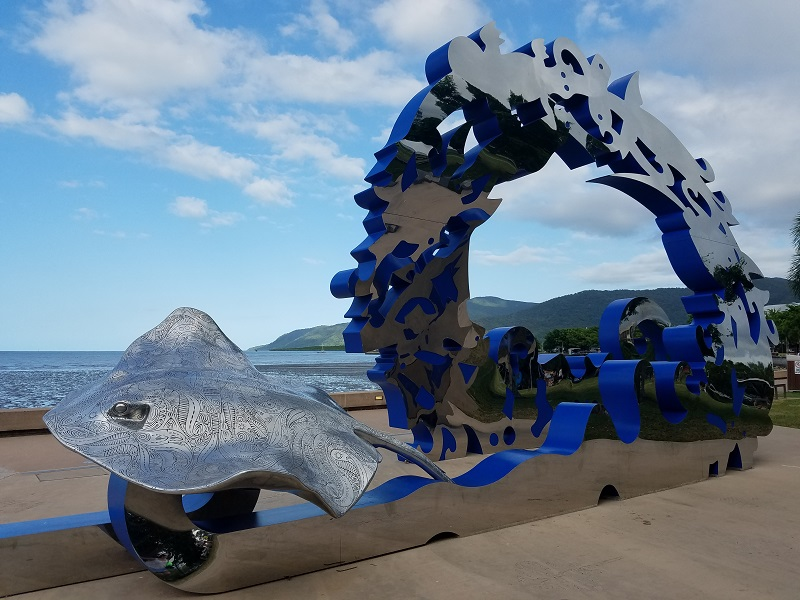It’s finally here! My 3-week scuba trip to Cairns, Australia has commenced. I’ve squeezed this trip in during my winter break from teaching and have one main goal: complete the PADI Divemaster Course! This course is the last step before I can take the scuba instructor course, which I hope to do this summer.
By the way, I guess I should clarify that I mean northern hemisphere summer, since it’s actually summer down under as I write this in humid, sweltering heat.
To read about Days 7-15, see Part 2 here.
To read about Days 16-18, see Part 3 here.
You can see all my favorite photos from the trip here and watch my favorite videos here.
Days 1 & 2: Travel and settling in
Note: feel free to skip this and go straight to the next section if all you care about is diving! I don’t blame you if you don’t care about how I got there.
Getting there
Door-to-door travel time from my house in Tucson to my accommodation in Cairns took 32 hours. This included:
- Uber to the Tucson airport with a driver who refused to follow GPS (took 50 minutes instead of the usual 25) and texted while driving on the freeway
- Flight from Tucson to Dallas (note: this is the wrong direction)
- 2+ hour layover in Dallas
- Flight from Dallas to Sydney (16 hours!)
- Missing my flight from Sydney to Cairns because Qantas had an issue getting luggage to the bag claim area at the Sydney airport
- Getting on a Jetstar flight 3.5 hours later, and convincing them to let me take my carryon luggage (against their policy) because it was Qantas’ fault
- Waiting for my shuttle in Cairns for nearly an hour and a half (it “comes every 30 minutes”)
As you can see, a few things went wrong. No worries though – I didn’t have anything planned for my first day in Cairns.
The travel highlight, by far, was the flight from Dallas to Sydney. I was on the upper deck of an A380-800 (so quiet!), had a row all to myself, and slept about 12 of the 16 hours.
Settling in
I got to my accommodation around 4 pm. I wanted to save money but also have personal space, so I booked a room for myself at a hostel, Dreamtime Travellers Rest. It’s pretty bare bones: I have a bed and a small fridge in my room, but air conditioning costs extra and the bathrooms and showers are shared. Internet is free, but only available in the common area, which is outside (and remember, it’s summer and hot here!).
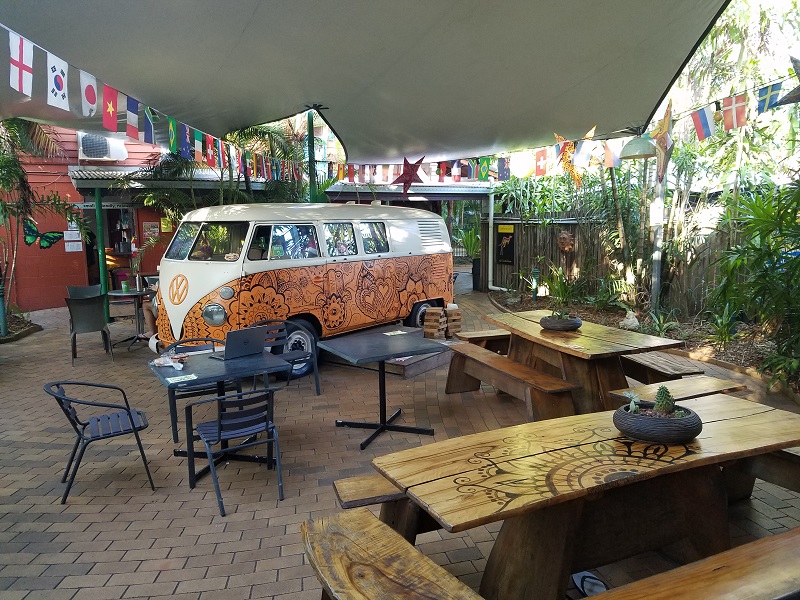
Common area at the hostel.
I dropped off my luggage and walked about a half mile to Deep Sea Diver’s Den, the scuba center I’m doing my PADI divemaster course with. We discussed logistics, they photocopied my medical form, and I left feeling all set to start the next morning.
After a quick stop at the grocery store, I went back to my room, joined the pizza night at the hostel, and read a few tourist pamphlets before falling asleep at 10. I was pretty happy to have stayed awake that late, given that it was 5 am in Tucson by then.
Day 3: First day of PADI Divemaster Course!
Jetlag? What jetlag? I woke up at 6:30 am the next morning. No sleeping pills or anything. Perfect! I did some scuba review for a couple hours then headed to the dive shop at 9 to get started on the training.
Technically, I started several months ago, and I completed PADI’s e-learning for the divemaster course about a month before leaving for Cairns. I reviewed that material while I traveled, every time I was in an airport and had internet access, so that I’d be ready to take my written exam.
Paperwork and divemaster final exam
As all scuba divers know, each trip begins with paperwork. This trip was no exception. In addition to the paperwork, my instructor, Sirio, gave me a good intro/overview to the course.
Next, since I already had a good hold of the written materials, I took my written PADI divemaster exam straight away. Exams don’t really bother me, so it wasn’t a problem. I was just happy to get it over with, so I could get in the water and start practicing skills. After all, nobody goes through a divemaster course because they want to take exams. We want to be in the water!
Waterskills exercises
After the exam, I got a couple more of the straightforward bits out of the way: the waterskills exercises. Actually, although they were straightforward for me due to my swimming background, for some people these are rather tough. But former swimmers will all breeze through a 400m swim, an 800m kick with fins on, and 15 minutes of treading water. I managed the highest score on all 3 (the first 2 are timed), despite not having gone for a proper swim in over a year.
Lunch
It was around noon by this point, so Sirio and I had lunch together. While we ate, we talked about our respective websites. He’s building one right now that he plans to launch in a couple weeks (I’ll add a link once it goes live!). He also told me about some of his experiences as a divemaster and then dive instructor. Diving has taken him around the world, from his home country of Italy to Southeast Asia to Australia.
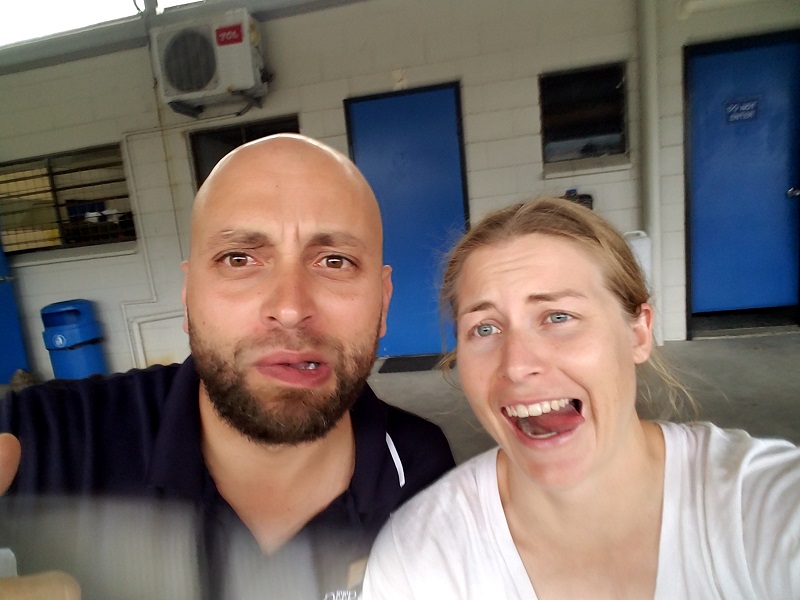
Selfie with Sirio.
More waterskills exercises
After lunch, we hopped in the water and wrapped up the final two waterskills exercises: a 100m diver tow and a full equipment exchange underwater.
The equipment exchange is actually kind of fun – you have to share one diver’s air source while getting all your equipment off and then putting all of your partner’s equipment on. It’s definitely a good way of checking that you can stay calm and think through action steps while being in a less than ideal situation (i.e. limited air). It was actually so fun we did it twice! We had to get back into our original equipment anyway, so why not?
Dive skills workshop: practice
The last thing for the first day was to start working through the dive skills workshop. To be a PADI divemaster, you have to demonstrate 24 skills (such as taking off your mask, replacing it, and clearing it underwater), each to a pretty high standard. The skills are familiar to every diver, since they’re all covered in the Open Water Diver (beginning scuba) course. However, divemasters must perform them slowly, easily, and correctly the first time. This makes tons of sense, since divemasters assist with training and have to demonstrate skills to students.
After practicing all the skills, Sirio and I called it a day. Almost – first, he showed me how to refill air tanks using the compressor, a valuable skill for anyone actually working in the dive industry.
Reef Teach
I got back to my room around 5, had a quick bite and shower, and left at 6 to go to Reef Teach. One of the Diver’s Den employees, Nicole, suggested it to me and we walked over together. It was a great introduction to the creatures that inhabit the Great Barrier Reef, and a fun way to start to learn how to identify them.
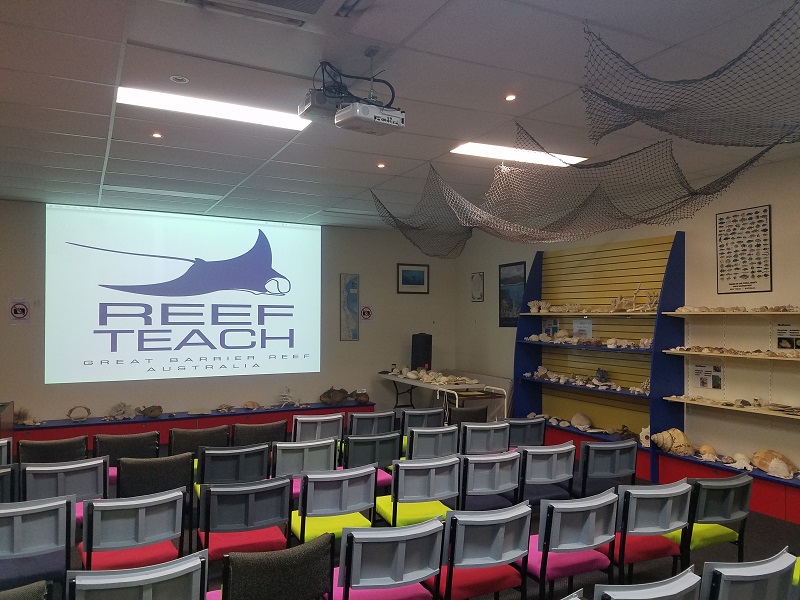
Reef Teach classroom.
Day 4: Skills workshop and divemaster-conducted programs workshops
I woke up around 6 again, and got in some work before heading back to the pool. It was another full day of learning!
Dive skills workshop: evaluation
Sirio and I started around 9 again, and we picked up where we left off: the dive skills workshop. This time though, I was on my own, with no assistance or reminders from Sirio. We went through each of the 24 skills and he scored each of them on a scale from 1 to 5. I don’t remember all my scores, but I do know they ranged from 3 to 5 (mostly 4s and 5s), and I received the points necessary to pass.
Divemaster-conducted programs workshops
After lunch, we moved on to divemaster-conducted programs workshops. In these workshops, I had to lead programs as I would for patrons at a scuba center. Since we had no real clients to use, Sirio played the part of naïve/forgetful participant.
The first workshop was Discover Scuba Diving, a program that’s run for people who want to try scuba out but aren’t ready to commit to a full 4-day course and certification. The second was a scuba review program, one that dive centers run for people who are certified but want a refresher before going to the ocean.
Both workshops required me to give a briefing, demonstrate skills, and assess and correct the participant’s skills. It was interesting to get to see scuba from the teaching side rather than the learning side, even if Sirio was just pretending. Since I’ve spend most of the last year and a half teaching engineering, it was also fun to try out some of the same teaching techniques in a different setting.
Rescue practice
After the workshops, I was almost done for the day. The last thing to do was a simulated rescue scenario, in which Sirio pretended to be unresponsive and not breathing underwater and I had to save him. I’ve done this before, in the PADI rescue diver course, but it was really helpful to review it since it’s been a few months.
Exploring Cairns
Sirio and I were done by 4:30, so I decided to go for a walk around town while the sun was still out. I wandered down Cairn’s main street, Shield St., and then along the Esplanade, which is a walkway along the coastline. I also bought a Great Barrier Reef reference book to help me identify wildlife once I finally get out there!
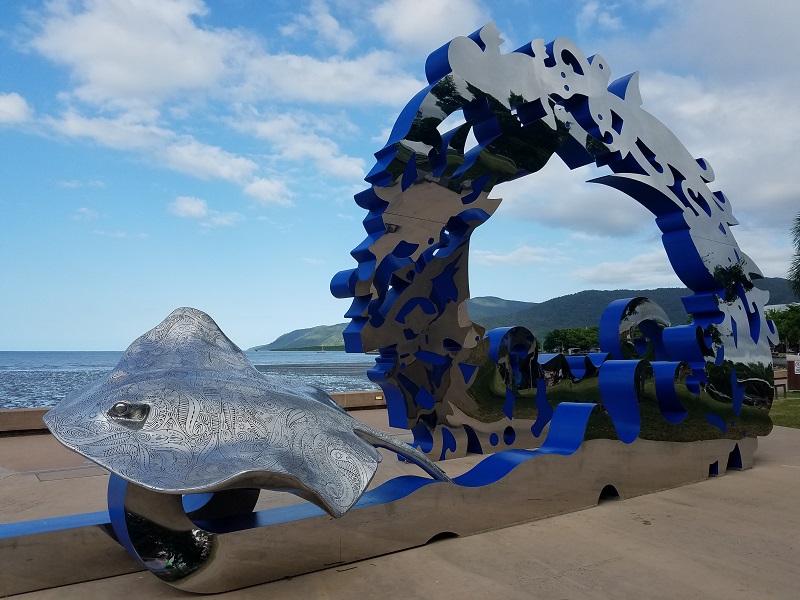
Stingray statue at the Esplanade.
Days 5 & 6: Off
2 days off! Woohoo!
Except. Wait. I had work to do. This is what happens when you leave the day after the semester ends and don’t return until the day before you’re supposed to start teaching again. But really, it’s worth it. So I spent two days holed up in my hostel, reading about heat exchange and fluid flows and watching previous lectures on the subject. And also dreaming of the Great Barrier Reef…
Next up: shadowing an Open Water Diver Course
You can think of the divemaster course as having 3 parts: theory and skills training in the pool, assisting with a PADI Open Water Diver Course and a continuing education course (for me it will be Advanced Open Water), and completing practical skills and workshops in open water. Next up is the second part: assisting with the courses. I’ll let you know how it goes!
To read PADI Divemaster Course in Cairns, Australia (Part 2), click here!
To read PADI Divemaster Course in Cairns, Australia (Part 3), click here!
To see all my favorite photos from the trip, click here!
To watch my favorite videos from the trip, click here!
Share this Post
